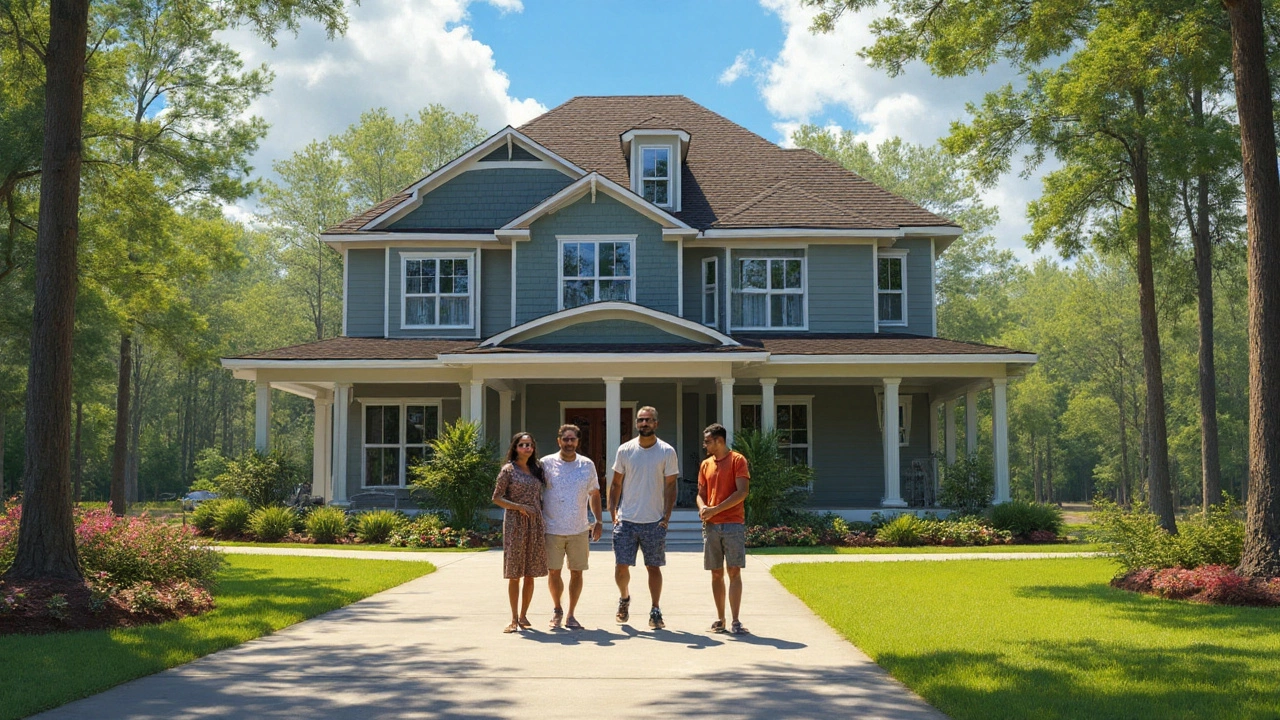Prices don’t sleep, and they sure haven’t been snoozing in Louisiana’s construction world. So if you’re sizing up the cost to build a 3,000 square foot house here in 2025, brace yourself—there’s some sticker shock, some line items that’ll make you scratch your head, and plenty of ways budgets get derailed. I remember chatting with my neighbor over the fence, coffee in hand, when he told me about his friend who thought his new build would come in under $200,000, only for reality to laugh in his face. Not so funny when you’re staring at quotes bigger than your dog Max’s appetite. The real question isn’t just "how much," but what’s eating up that cost, and what’s actually worth splurging for?
The Big Picture: What Does It Cost to Build a 3,000 Sq Ft House in Louisiana?
Let’s put it on the table—literally. Average home construction costs shot up across the U.S. in the last three years. In the Pelican State, you’re looking at a range that might surprise you, because it’s not just about bricks and boards. The average cost per square foot in Louisiana sits between $140 and $210, depending on finishes and location (hello, flood zones and Bayou lots). Go basic, do it smart, and you might land at the lower end. Aim for high ceilings, custom everything, and a pool, and your bill climbs fast.
| Cost Component | Low | High |
|---|---|---|
| Base Construction | $420,000 | $630,000 |
| Architect & Permits | $25,000 | $50,000 |
| Site Prep & Utilities | $10,000 | $40,000 |
| Finishes & Custom Features | $60,000 | $130,000 |
| Landscaping | $7,000 | $25,000 |
| Total | $522,000 | $875,000 |
Those numbers might make you blink, but they line up with what’s happening as labor and materials shot through the roof. Lumber alone nearly doubled since 2020, although it has calmed down a bit. Concrete, wiring, and even good old sheetrock? All pricier than you’d hope. Plus, Louisiana’s got some special delivery costs, from river crossings to tricky soils, so you’ll want a builder who knows what’s under your site—more on that in a minute.
The Cost Breakdown: Materials, Labor, and Hidden Surprises
Where does your money actually go? Think of the budget as chunky slices: foundation, framing, big-ticket systems (plumbing, electrical, HVAC), and finishes. For a 3,000 sq ft house, foundation costs often catch folks off guard—Louisiana’s poor soils and flooding history mean you may need deep pilings or extra drainage, which can double your site prep bill. Expect foundation alone to eat up 10-15% of the project. Framing comes next, at around 15-20%—lumber prices jump around, but locally sourced can help you save some bucks.
Labor is another biggie. Louisiana’s construction worker shortage—yep, people left the trade during the pandemic—pushed wages up. Crews are charging more, and if you want skilled pros who show up on time, you’ll be paying a premium. Plumbing, HVAC, and electrical each run between 8-12% of your total budget. Don’t forget insurance—this is not optional here. Builders risk, homeowner’s, and flood insurance rack up a couple grand on their own. The biggest "surprise" costs? Permits, inspections, and dealing with local bureaucracy. You might think you’re seasoned after making it through the DMV. Think again. Parish offices move at their own pace, and every hiccup costs you time and money.
One curveball that hits a lot of new owners—appliances and furniture. These aren’t usually counted in "construction costs," but who wants to move into a beautiful home and realize you still need to shell out another ten grand for a fridge, stove, and washer-dryer? As for landscaping? Not cheap either, especially if you want anything more than a patch of sod and a few shrubs from the garden center. Keep a "just in case" fund—around 10% of your total budget—for change orders, supply delays, and yes, last-minute must-haves you didn’t think about when making Pinterest boards.

Finding the Right Builder: Pitfalls and Real Louisiana Tips
All builders aren’t created equal, and in Louisiana, that’s doubly true. Some have been swinging hammers since Bobby Jindal was governor, others roll in from out-of-state after every hurricane, promising the moon and leaving you with a crater of regrets. Go for someone licensed, local, and with legit experience on homes your size—ask for addresses, talk to past clients, even knock on doors if you have to. There’s a big difference between building a 1,400 sq ft starter home and a spacious 3,000 sq ft custom place. Reputation matters here almost as much as the contract.
And get everything in writing. Never trust wishy-washy estimates or handshake deals. Your contract should spell out materials, deadlines, payment schedules, and penalties if they don’t deliver. Louisiana law actually says a builder can’t pull more than a certain percentage up front—usually 10%—so don’t hand over your entire savings before they even bring a shovel to your lot. Watch for allowances too; these are the "polite" way of saying, "we’re guessing what you’ll spend on that, and if you go over, you pay the difference." Tile, lighting, doors, cabinetry—they can all be "allowances," and surprise, they almost always end up higher than the builder’s sheet.
If you live out of state, find a project manager. Remote builds are risky, and you need boots on the ground—someone you trust to catch short cuts, missed steps, or, heck, just to make sure the wrong wall color isn’t going up. Like my buddy who let his tile guy "decide what looks best"—let’s just say, blue bathrooms only look good if you actually ordered blue.
Special Costs for Louisiana: Land, Flood Zones, and Local Hurdles
Land itself isn’t cheap. Good lots near New Orleans or Baton Rouge run high, while rural sites in places like Rapides or Sabine Parish can be a steal—but often need more site prep. You’ll want a soil test before you buy; some of the muck here will swallow your foot, let alone your slab, and those issues can turn a "great deal" into a money pit. Don’t ignore flood maps, either. Louisiana’s got flood risk branded into its DNA, and FEMA keeps redrawing those maps. If your dream house sits in a flood zone, you’ll need extra insurance and potentially extra elevation—both of which cost more than you bargained for. In some parishes, bringing in fill dirt to raise the site is required, and that’s a five-figure job you can’t skip.
Then there’s permits and codes. Each parish does things a little differently. Some, like St. Tammany or Lafayette, have stricter wind and flood construction rules than others. Plan for extra engineering costs to meet those codes, especially for roofing, windows, and anchoring. If you’re using energy-efficient designs, check for local incentives— sometimes Entergy or other utilities offer small rebates for efficient lighting or HVAC, and those shave a bit off costs in the long run. Want solar panels? Now’s a good time, but factor the upfront investment (usually $25,000 or more) into your total.
Finally, Louisiana weather is legendary, and not in the best way when deadlines are tight. Summer storms, tropical rain, and the occasional hurricane all slow down projects, and every rainout pushes costs higher. Your contract should lay out what happens when weather delays things—is it on the builder, or do you share the financial pain?

Smart Ways to Trim Costs Without Sacrificing Quality
Cutting corners never ends well (ask anyone who’s had a cracked slab), but there are ways to keep your wallet from bleeding dry. First, go in with a solid, simple design. Every bump-out, fancy angle, or extra dormer raises the labor and material bill. Stick with a basic rectangle or L-shape layout. Second, source materials yourself if the builder allows it. Sometimes, you can nab deals on flooring, tile, or even kitchen cabinets by hitting local supply auctions, Facebook Marketplace, or salvage yards—one couple I know saved thousands this way and ended up with real cypress beams in the living room. Just make sure what you buy actually meets code, especially for things like windows and doors.
Next, pay attention to timing. Build in the off-season if you can; demand dips a bit in winter, meaning subs are less slammed, and you might find more negotiating power. Also, go semi-custom instead of full-on custom. Production builders have their systems locked down, and you can often ask them to swap a few finishes while keeping the main structure standard—a compromise between "dream home" and "wallet-friendly." Max, my dog, would also point out that skipping a fancy dog-washing station in the mudroom saved us, like, $2,300 during our last remodel. He’s fine with a hose and a towel.
If you qualify, check out local or state-backed financing help. Louisiana Housing Corporation sometimes offers deals on first homes or energy-efficient builds, and some parishes cut permit fees for "green" construction. And always—always—shop around for insurance. Paying attention to small stuff, like security systems or impact-rated glass, can cut premiums a solid chunk.
Don’t underestimate the value of a good inspector, either. Bring one in at each major phase: foundation, framing, before drywall, and final walkthrough. It feels like extra hassle and expense, but catching a bad plumbing run or some sketchy electrical work early is a lot cheaper than fixing a leak in brand new sheetrock a week after you move in.
If you’re building in a neighborhood with a homeowners’ association, review the rules first. Some will nickel-and-dime you with fees for everything from mailbox styles to landscaping, and it’s always better to budget for that up front instead of forking out later. And as a last quick tip—always have emergency funds. The best-planned projects still hit bumps: lost shipments, cracked tiles, or maybe even a raccoon that decides your attic is the place to be (happened to a friend outside Covington—wildlife here has opinions!).
Your cost to build a 3,000 sq ft home in Louisiana depends on design dreams, builder skills, smart shopping, and a little help from Lady Luck. Think big, plan carefully, and be ready to flex when those legendary Louisiana surprises roll in. And give Max a pat—sometimes, all you can do is grin and roll with it.

Written by Fletcher Abernathy
View all posts by: Fletcher Abernathy